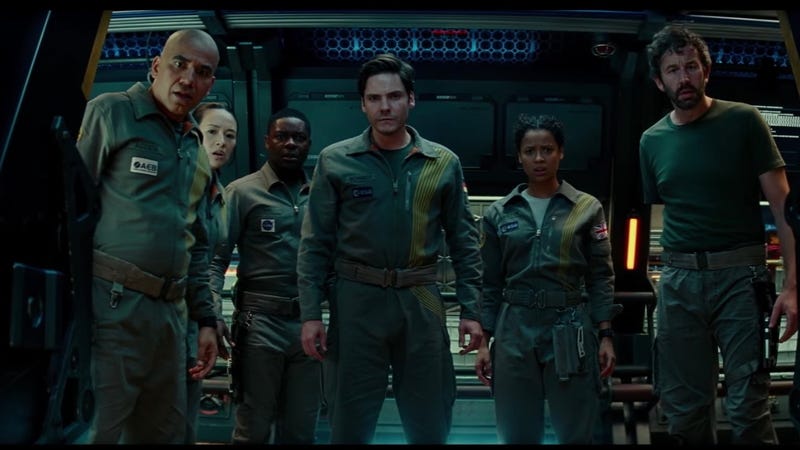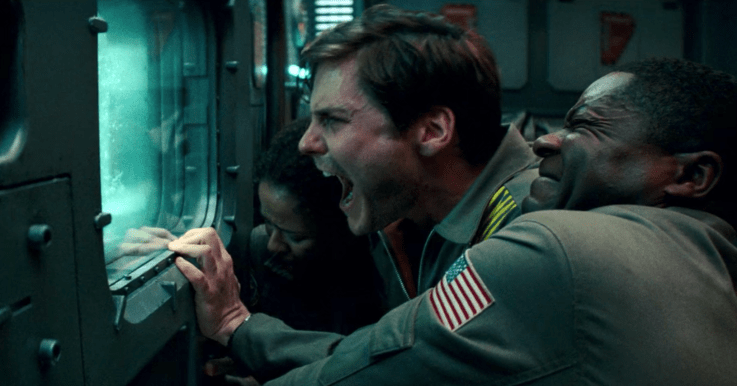Here we are in the aftermath of the Super Bowl and Netflix just dropped a bomb on us by releasing the third Cloverfield film, AKA God Particle AKA its final and official name, The Cloverfield Paradox. It’s a film in a franchise that is the cinematic equivalent of a shotgun. When shot, it goes all over the place and lands in different areas with different results. The Cloverfield Paradox wants to make that shotgun shoot in one direction, ensuring maximum damage on the target but instead, it ends up misfiring the shotgun and shooting itself in the foot, making an embarrassment out of itself in the process.
The world is in shambles, scientists are predicting they have roughly five years left until they use up the planet’s precious natural resources completely. This has resulted in intense conflict and tension between the world’s most powerful nations. Six scientists from various nations are sent up to a space station to help find a solution to the world’s resource problem. The research has them developing a laser beam-like thing that can use particles to create more natural resources for Earth.
When they finally activate it, things go awry and the particle creator spawns separate unstoppable dangers for both the space-bound scientists and Earth.
I won’t go too much further into the plot as that’s part of the fun of the Cloverfield series, going into a movie you know next to nothing about. However, there may be a reason why Paramount Pictures chose to opt for a straight to Netflix release rather than marketing it for theaters, where it would’ve likely suffer from being a box office flop.

The Cloverfield Paradox isn’t awful, but it is the messiest of the Cloverfield franchise. It’s the one where you can see where the original script for God Particle stops and where Paramount’s ideas for The Cloverfield Paradox begin. For a film that is meant to help connect all of the movies together, and even sync up with the first film, it has a lot of holes in its timeline.
If you view The Cloverfield Paradox as a standalone film, disconnected from Abrams’ franchise, it’s like a C-tier version of Alien. If you saw 2017’s Life, it’s on the same level of that. Which means it’s not a bad movie altogether.
The Cloverfield Paradox is something you can have fun watching, however, you probably won’t remember it in a few weeks. Which is probably not the most encouraging thing to hear, but there are still things to enjoy in The Cloverfield Paradox… it’s just most of those enjoyable items have pretty much next to nothing to do with the Cloverfield franchise.
The movie tackles the idea of different dimensions colliding with each other, fighting to merge almost into one whole entity and struggling to do so. The different dimensions have aspects that can’t all survive being in one dimension which brings issues when they attempt to do so.
The Cloverfield Paradox gets WEIRD and in a really good way. Some of the movie’s best sequences are from it just going so far down a rabbit hole that if you were to drop a flashlight down it, you would lose track of the light. There a few great moments of pure body horror which had me cringing. but also smiling because I hadn’t seen anything like it. The movie is tense, fun, and really creative.

The Cloverfield Paradox will likely divide fans, after watching it directly after it released, I saw a handful of negative opinions flooding in. The film makes a strong effort to go to new places and do original things in a subgenre (which essentially is creepy stuff happening in space/on a space station) that is flooded with clones of each other. Questions about alternate dimensions, logic, general laws of life and science that we’ve created for ourselves are posed in the film. Granted, some of those questions and theories that you come up with in response to those questions can actually end up being way more interesting than the movie itself, but that really depends on how hard you think about it.
It doesn’t have the mind-bending nature of a dimension-hopping movie like Coherence (2014), but it makes decent strides to try and open different parts of your brain.
The film suffers in its attempts to make the Cloverfield movies connect together. If anything, it made the already somewhat confusing universe nearly incomprehensible. 10 Cloverfield Lane ended in a way that made it seem like maybe it was just an alternate timeline, that the franchise wouldn’t have direct sequels and would instead be like a lengthy episode of the Twilight Zone every couple of years. The Cloverfield Paradox says sure to that theory but attempts to connect the films all together in the messiest way possible.
There is no year or time given in this film, but it seems to be taking place in conjunction with the events of Cloverfield. While our heroes in space try to survive, we occasionally cut to one of the crew members’ family to see what’s happening on the ground. While this could have added more insight, this subplot could not be any more of a snoozefest. It could be completely cut out of the movie and there would be almost nothing of substance missed aside from one or two moments from the original film being seen from another perspective.
Very little happens on the planet from this new perspective, there are no new revelations, the character isn’t very engaging,

The problem is, there’s a lot that just doesn’t seem to add up in terms of making everything come together in a cohesive manner. Instead of the film giving viewers euphoric moments of “Woah! I can’t believe they found a way to connect them in such a great way!” it leaves you with a blank face thinking, “This doesn’t make any sense.”
It’s too much to go into here, but if you were to put out a visual timeline of key events in Cloverfield and another for The Cloverfield Paradox, it likely wouldn’t line up. The film gets too caught up in trying to answer things that it doesn’t realize that it has pieces of its answer way back in 2008. It doesn’t need to come up with entire new answers, it just needs to take what we’ve already seen and expand on it. Perhaps, maybe we don’t need answers at all because the internet has been having more fun making our own theories and connections for the last decade.
For some reason, I can’t help but feel like the film would’ve been better off if the filmmakers were left to create their original vision. Maybe they could have expanded on their interesting and almost philosophical ideas without burdened by the baggage of a franchise that is bursting at the seams with questions that the studio feels needs answers. The film ends up devolving from something really fresh to something by the numbers with the occasional good moment that keeps you from turning it off.
The Cloverfield Paradox is something you can sit down and enjoy if you’re looking for some cheap thrills and have an active Netflix subscription. It’s clear Paramount didn’t have a ton of faith in The Cloverfield Paradox and dumped it on Netflix because of that.There are some moments in the film where it shines and it shines bright, but it has other moments that feel like it’s just a flickering light bulb waiting for someone competent to come in and twist it into place.
If you’re a Cloverfield fan, you’ll likely walk away feeling a tad empty and upset while you wait for the already announced fourth film. If you’re coming at this as a newcomer maybe this will be a fun entry point.
If there’s one thing that Paramount and J.J. Abrams’ team should take away from The Cloverfield Paradox, it’s that maybe some questions don’t need to be answered.









